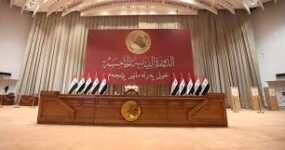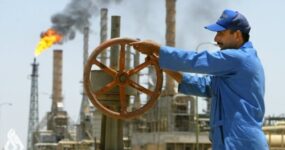Prime Minister Mohammed Shia al-Sudani spoke from New York about the most important strategic files, while confirming the suspension of gasoline imports at the beginning of next year after the completion of the FCC project in Basra.
The Prime Minister’s Media Office stated in a statement received by the Iraqi News Agency (INA), “Prime Minister Mohammed Shia al-Sudani participated in New York, after midnight on Wednesday, in a dialogue session held by the American Chamber of Commerce and Al-Monitor, in the presence of an elite group of investors, businessmen, representatives of American companies, and the Iraqi-American Business Council.”
During the session, he referred to “the new reality of Iraq, which is witnessing an economic and developmental renaissance in all its sectors, and has also taken great strides in the field of energy investment and associated gas, which had been wasted for years and cost the country losses estimated at billions of dollars, due to the import of gas and petroleum derivatives.”
He stressed that “the government has embarked on a series of rapid projects, including the important agreement with Total, which will contribute to increasing oil production and investment in associated gas by about (600) million standard cubic feet, in addition to offering the fifth and sixth rounds’ annexe, and entering into contracts to produce oil and invest in gas,” indicating that “after 2028, Iraq will achieve self-sufficiency in gas, in addition to activating oil derivatives projects, including the strategic Karbala refinery, whose production capacity reaches 140 thousand barrels per day, as well as rehabilitating the Baiji refinery, which was completely destroyed during the battles to liberate Baiji, and its production capacity is 150 thousand barrels per day.”
The Prime Minister said during the dialogue session: “When I assumed my duties as Prime Minister, the investment in associated gas was less than 40 percent, and now the percentage has risen to about 70 percent.”
He added: “We have finished importing petroleum derivatives, and we will stop importing gasoline at the beginning of next year, after completing the FCC project in Basra.”
He continued: “We are ready to enter into a partnership with American companies in the oil industry sector,” indicating that “Iraq’s vision is to convert 40% of exported oil into transformation industries, which will provide more benefits than selling crude oil.”
He pointed out that “the government’s policy is based on diversifying the contracting parties that invest in our oil and gas fields without specific conditions,” noting that “the procedures for the licensing round are clear and transparent and there is no favouritism or preference for one company over another.”
He added, “Development cannot be achieved without a solid banking sector that operates according to approved international standards, and 95% of financial transfers in Iraqi trade take place through reliable banks.”
He explained that “the currency selling window will be closed at the end of this year, and the money laundering office at the Central Bank is working effectively,” noting that “the government has contracted with Ernst & Young to reform the government banking sector, and we have strengthened citizens’ confidence in banks and expanded financial inclusion.”
He stressed that “Iraq today is going through an unprecedented phase of stability and recovery since 2003, and it is an opportunity to support the transition from a phase of wars and conflicts to a phase of development and stability,” noting that “a stable Iraq in a sensitive region is beneficial to the world, which is what we have seen since October 7, as Iraq has maintained a great deal of balance and calm, and we have kept Iraq away from the arena of conflict.”
He pointed out that “the security forces have reached an advanced stage of capability and efficiency, and we have started an armament program to enhance their capabilities, and ISIS today does not represent a threat to our security,” pointing to “the need for American small and medium-sized companies to form partnerships with Iraqi companies.”
He added: “We are working to create job opportunities for young people by activating the private sector or supporting their private projects, through several programs, including the (Riyada) initiative,” noting that “the size of the projects granted for investment will provide a large number of jobs, and the necessity for companies operating in Iraq to open training centers to develop the capabilities of young people.”
He continued: “We have confirmed to the companies operating in the electricity sector the establishment of stations maintenance centers to speed up completion and reduce costs,” indicating that “the government has a clear direction to support the agricultural sector, and farmers and growers are in a transitional phase to use modern irrigation technologies that the government has supported by 30%.”
He added: “We provided loans to workers in the food industries sector of various types, and part of them are covered by sovereign guarantees,” noting that “the Central Bank has independence and exercises its powers with complete professionalism, and there is an intention to establish a new bank that adopts the latest technologies.”
He called on “all companies working in the field of electronic payment to work in Iraq,” stressing “providing them with all facilities.”
He concluded, “We have developed a plan to develop the infrastructure, with allocations amounting to $83 billion.”


